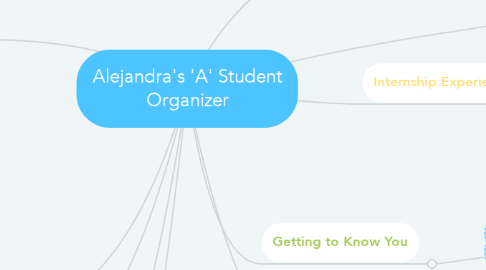Alejandra's 'A' Student Organizer
by Alejandra Travieso


1. Classroom Reflections
1.1. It is important for me to be open minded when it comes to way I can improve my classroom. I tend to immediately shut down when people who don't like math try to give me advice, but I need to be prepared to learn, which will enable me to teach my students the best that I can.
1.2. ELLs are being pulled out of their classes every day to have isolated instruction in English. When I become a teacher, I want to provide my students who are ELLs with the content they need in math while showing them important aspects about English while in math.
1.3. I have noticed that my experiences as a student differ greatly from those around me. As a student I have had to constantly fight with my ADHD and work extremely hard to ensure that the work I am putting forward is the best I can do. While I believe a lot my classmates have had to work very hard, I think my personal experiences can bring a new light to what my peers think of individuals with attention disorders.
2. Differences Between Myself and Those Around Me
2.1. Understanding the differences I have with my students affects the way that I need to teach my students. If I am fully aware of my students situations, I will be able to better specify lessons towards them.
3. Blog Reflections
3.1. I like what I wrote about in my Module 3 blog post and would like to explore this method of teaching and how I can tweak it more.
4. Lesson Plan
4.1. Use Project Based Learning to help students develop a deeper understanding of the material we are teaching them.
4.2. Encourages our students to connect the information they are being told in class and the information they are experiencing in the world around them, to support their application of learning to future information
5. Assessments
5.1. Assessments can be incredibly useful when it comes to determining where our students are on a certain topic and how much more we will have to go over a topic.
5.2. Assessments are a reflection on us as teachers, not on our students. When we use formative, summative, or determinative assessments, the information we gather should all be taken in to determine what we need to focus on more.
6. As I have watched more and more the students in my mentor teachers classroom, I have realized that allowing them to have their phones out is not helping his students at all. Many students are failing their quizzes and tests etc. I do not think we have any leverage with our students paying attention when we always allow them to be on their phones.
7. Black Ants and Budhists
7.1. Allowing ELLs to work in groups with students who are and are not ELLs helps them to practice their English more and increase their collaborative and social skills with their peers.
8. Internship Experiences
8.1. My mentor teacher allows his students to have their phones out. This method appears to be working for him as the students who want to succeed are focusing by listening to music and everyone else is not distracting their peers by trying to hide their phones. However, the students tend to all pay attention to him.
9. Getting to Know You
9.1. Giving students a bingo sheet
9.1.1. Students have to go around the class and have students find peers that either know how to do a certain math problem or have a certain characteristic

